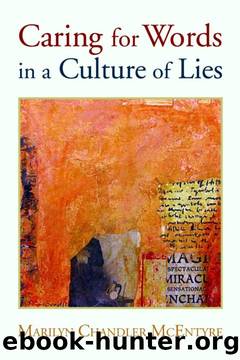Caring for Words in a Culture of Lies by Marilyn Chandler McEntyre

Author:Marilyn Chandler McEntyre [McEntyre, Marilyn Chandler]
Language: eng
Format: epub
Published: 2010-12-06T17:41:00+00:00
Who are the great storytellers among us now? Toni Morrison, whose novels retrieve and revise the art of storytelling, offers a model of rich, courageous experimentation as well as an imaginative, resilient fidelity to a complex tradition. Wendell Berry, whose stories reaffirm what we stand to lose in trading the demands of land and community for the dubious conveniences of urban anonymity. Barbara Kingsolver, whose characters struggle with the changing shape of family and survival on the social margins. Rudolfo Anaya, who chronicles bicultural lives lived on very different terms from those of the dominant culture that surrounds them. We have many among us - perhaps too many: when Flannery O'Connor was asked whether university courses in creative writing stifled young writers, she is said to have responded, "They don't stifle enough of them!" But we have much to learn from the best among them. I would hope that as conservators of story we would keep alive in ourselves the love of stories by inventing them, telling them, reading them, embellishing them, and resisting the lure of the video store now and then to content ourselves with words and imaginings. We need to hear one another's voices. We need to hear one another's stories, and we need to tell our own, because, being human, we need to be healed.
Part of that healing is a re-ordering of our expectations. The myths and stories we inherit shape our earliest hopes, sometimes falsely. As stories expand our imagination for alternative ways of living, our disappointments may soften into lessons, and our hopes become deeper and more complex. As Oscar Wilde observed, life imitates art. We derive our basic expectations from the narrative patterns we internalize - the hope of a happy ending, the recognition of the need for sacrifice, a sense of how communities work, an understanding of family. Stories provide the basic plotlines and in the infinite variations on those plots help us to negotiate the open middle ground between predictability and surprise.
Anyone who has read the same story night after night to a child knows how traveling a familiar narrative path through scary places and back to the safety of home and hearth can provide a respite from the confusions of the day. Even tragic tales reassure in the way they remind us of the basic terms of our lives together and how commu nities survive significant loss. Perhaps their greatest comfort value lies in the way they point beyond themselves to the larger stories of creation and promise and salvation.
Like good sermons, however, stories not only comfort but also "afflict the comfortable." Usually they do this by holding up a mirror in which we recognize our own flaws and faults. For instance, I recently taught Ursula LeGuin's little parable, "The Ones Who Walk Away from Omelas," to a group of nineteen-year-olds, some of whom walked away from class sobered and troubled by the implications of a mythic society whose luxuries and comforts were maintained on the condition that one child be kept in squalid, abusive confinement.
Download
This site does not store any files on its server. We only index and link to content provided by other sites. Please contact the content providers to delete copyright contents if any and email us, we'll remove relevant links or contents immediately.
The 5 Love Languages: The Secret to Love That Lasts by Gary Chapman(9761)
The Space Between by Michelle L. Teichman(6911)
Assassin’s Fate by Robin Hobb(6184)
Wiseguy by Nicholas Pileggi(5749)
Everything Happens for a Reason by Kate Bowler(4722)
Gerald's Game by Stephen King(4625)
Pillow Thoughts by Courtney Peppernell(4262)
A Simplified Life by Emily Ley(4145)
The Power of Positive Thinking by Norman Vincent Peale(4045)
Harry Potter and the Prisoner of Azkaban (Book 3) by J. K. Rowling(3337)
Resisting Happiness by Matthew Kelly(3331)
Girl, Wash Your Face by Rachel Hollis(3270)
Being Aware of Being Aware by Rupert Spira(3262)
The Code Book by Simon Singh(3162)
The Secret Power of Speaking God's Word by Joyce Meyer(3144)
More Language of Letting Go: 366 New Daily Meditations by Melody Beattie(3015)
Real Sex by Lauren F. Winner(3000)
Name Book, The: Over 10,000 Names--Their Meanings, Origins, and Spiritual Significance by Astoria Dorothy(2962)
The Holy Spirit by Billy Graham(2932)
